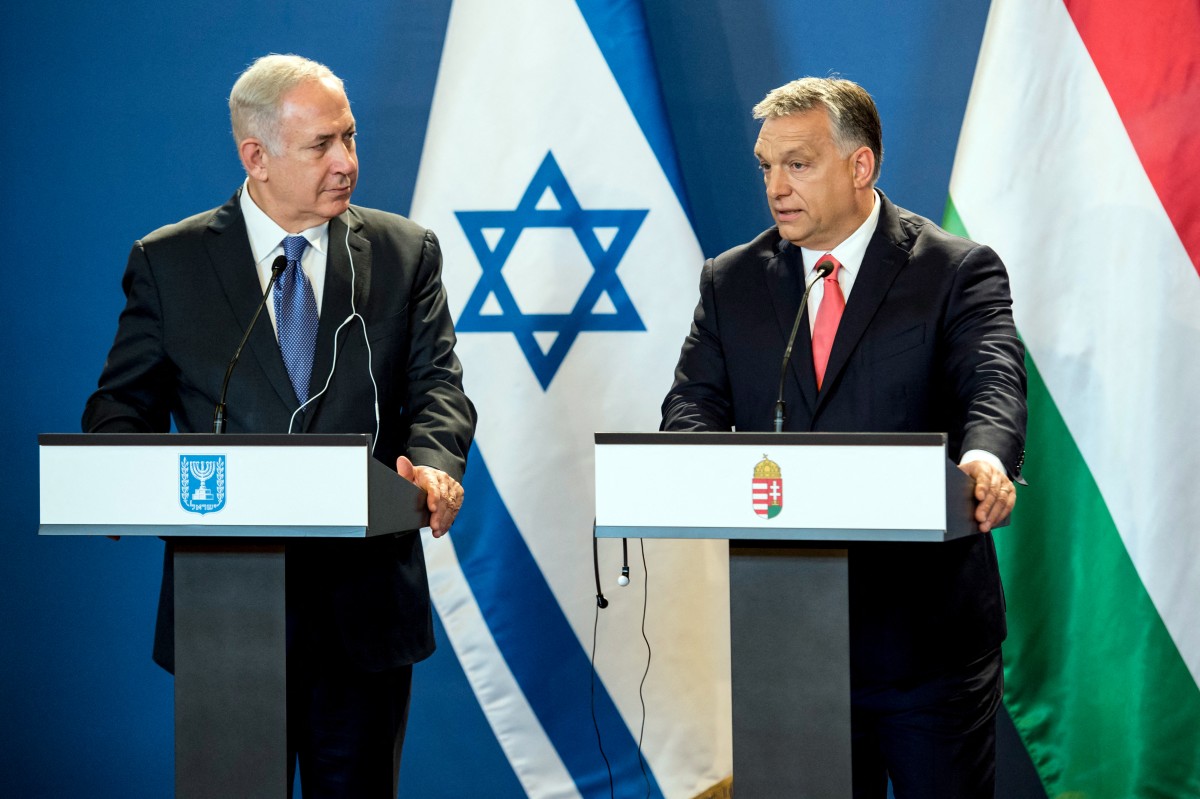Orban vowed the EU member would not execute the warrant, despite being an ICC member, saying the court’s decision “intervenes in an ongoing conflict… for political purposes”.
“Welcome to Budapest, Benjamin Netanyahu!” wrote Hungary’s Defence Minister Kristof Szalay-Bobrovniczky on Facebook as Netanyahu began his visit, and after greeting him at the airport in capital Budapest.
Netanyahu was welcomed with military honours, after which he will hold talks with Orban.
A joint news conference is expected around 12:30 pm (1030 GMT).
‘Legal obligation’
Experts say the Israeli premier, who is scheduled to stay in Hungary until Sunday, is trying to diminish the impact of the court’s decision, while hoping to drive attention away from tensions at home as he meets like-minded ally Orban.
“His ultimate goal is to regain the ability to travel wherever he wants,” Moshe Klughaft, an international strategic consultant and former advisor to Netanyahu, told AFP.
“At first, he’s flying to places where there’s no risk of arrest, and in doing so, he’s also paving the way to normalise his future travels.”
Germany’s chancellor-in-waiting Friedrich Merz in February vowed to make sure Netanyahu can visit his country.
The Hungary trip “goes hand in hand with US sanctions against the ICC,” Klughaft said, referring to the punitive measures US President Donald Trump imposed in February over what he described as “illegitimate and baseless actions targeting America and our close ally Israel”.
The ICC, based in The Hague, stressed it would be Hungary’s “legal obligation” and “responsibility towards other state parties” to enforce the court’s decisions.
“When states have concerns in cooperating with the court, they may consult the court in a timely and efficient manner,” ICC spokesman Fadi El-Abdallah said.
“However, it is not for states to unilaterally determine the soundness of the court’s legal decisions,” he added.
Hungary signed the Rome Statute, the international treaty that created the ICC, in 1999 and ratified it two years later during Orban’s first term in office.
The ICC, set up in 2002, has no police of its own and relies on the cooperation of its 125 member states to carry out any arrest warrants.
However, Budapest has not promulgated the associated convention for constitutional reasons and therefore asserts it is not obliged to comply with the decisions of the ICC.
Hungary has also repeatedly floated leaving the ICC — like Burundi and the Philippines — and has already decided to do so, Radio Free Europe reported on Wednesday, citing diplomatic sources.
Increasing pressure
The ICC issued arrest warrants for Netanyahu and former defence minister Yoav Gallant over allegations of crimes against humanity and war crimes — including starvation as a method of warfare — in Israel’s war against Hamas in Gaza.
The war was sparked by the militant Palestinian group’s attack against Israel on October 7, 2023.
After Orban invited him, Netanyahu responded by thanking his counterpart for showing “moral clarity”.
During the visit, Orban is expected to support Netanyahu on Trump’s proposal to relocate more than two million Palestinians from Gaza to neighbouring countries such as Egypt and Jordan.
Netanyahu’s trip comes as he faces increasing pressure over his government’s attempts to replace both the domestic security chief and attorney general, while expanding the power of politicians over the appointment of judges.
The Israeli prime minister also testified in a probe involving alleged payments from Qatar to some of his senior staff after two of his aides were arrested.
“One of Netanyahu’s methods is controlling the Israeli agenda,” Klughaft said, adding that the Hungary visit gives him a chance to set the conversation for days.
“In such a turbulent period, that’s worth a lot to him.”
In the past, some top leaders wanted by the ICC have thumbed their noses at the court and travelled to member states with impunity.
Mongolia ignored an ICC warrant last year when it welcomed Russian President Vladimir Putin for a state visit.
Putin is accused of war crimes for the alleged illegal deportation of thousands of Ukrainian children since the Russian invasion in 2022.








